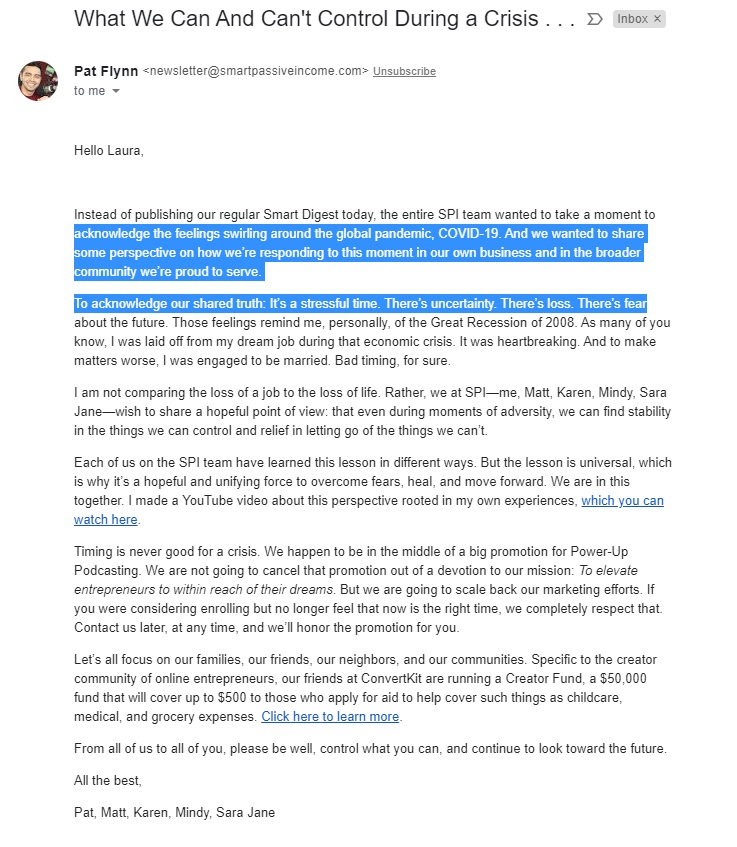How to Adapt Your Digital Marketing Strategy in a Time of Crisis

COVID-19. Coronavirus. #CoronaCrisis. My Corona. Whatever you call it, 2020 so far has been a tough ride. By now, everyone is aware of the importance of social distancing and regular handwashing, and we’ll leave it to the health experts to fill you in on those critical matters.
Here at Outbrain, our job is to help marketers find audiences and customers via native advertising on the open web. As more people are quarantined in their homes, businesses large and small are feeling the impact. Every day, new rules and restrictions come into play, and the goalposts are moving fast. So we decided to ask the Growth Marketing team at Outbrain (all of whom are working at home…) for their top tips and ideas about how to adapt your digital marketing strategy in a time of crisis. Let’s see what they had to say:
- Communicate directly and openly with customers
- Use your online advertising budget wisely
- Think of ways to fit your product or offer to the current situation
- Build goodwill with special offers
- Work strategically and efficiently
- Move anything you can online
1. Communicate directly and openly with customers
There’s a famous saying that “people show their true character when faced with adversity”. During the current #CoronaCrisis, the same thing can be said about businesses and brands.
Trust and authenticity are some of the most important aspects of a brand’s relationship with customers. According to the Edelman Brand Trust Report 2019, 81% of consumers say “I must be able to trust the brand to do what is right.” And what better way to build trust than to communicate openly and honestly? Especially during a crisis when everyone is feeling vulnerable.
This can be achieved fairly easily via an email or SMS to your distribution list, or a post on social media. The tone can be heartfelt, supportive, edgy, or matter of fact – it really depends on the character of your brand and the message you want to convey. The tone is not the critical part. The most important thing is to be honest and true. This is what customers value, and they will sense when it feels authentic.
Take a look at the example below of an email from entrepreneur Pat Flynn of Smart Passive Income. As far as marketing emails go, it is quite long. More importantly, it is sincere and generous. During a global crisis, brands should lower their masks a little, set aside the regular ‘rules’ and connect with customers in a more profound way.
2. Use your online advertising budget wisely
When there is any sort of national or global event – good or bad – internet activity skyrockets. People naturally turn to their smartphones and laptops to check the news, search the web, and hear what their networks are saying. During a crisis, impressions and page views tend to go through the roof, however, getting those extra page views to convert is very challenging. So while CPMs (cost per 1000 impressions) tend to decrease, CVRs (conversion rates) tend to decline as well – and sometimes at an even steeper rate, which commonly results in CPAs (cost per acquisition) becoming even higher.
Rather than focusing on impressions, now is a good time to change your digital strategy so you are paying for clicks only. That means advertising on channels and platforms that use CPC (cost per click), rather than CPM payment models.
3. Think of ways to fit your product or offer to the current situation
In 2020, if you run a supermarket or sell hand sanitizing gel, then you’re all set. But what about the millions of businesses that don’t? For many, a little creative thought is what’s needed to make a connection between the product and how customers can benefit from it during the crisis.
This is particularly true for e-commerce companies who can position themselves as providing a solution for customers’ current pain points. For example, during a period of social distancing when people are not visiting malls, an online clothing company can adjust its return policy to make it easier for people to “try and buy” at home.
Have a look below at how e-commerce gift store Uncommon Goods has positioned itself for the #CoronaCrisis. While people are not attending parties and celebrations (and therefore aren’t giving as many gifts), the company pitched the idea of “stay inside” gifts to combat the boredom of quarantine. This is a great example of a small messaging change that puts the company offering in a whole new light.
4. Build goodwill with special offers
“We’re in this together”. That’s not just a marketing slogan. We are all in it together, and when a business acknowledges this fact, it can find ways to help customers, the community and build goodwill along the way.
Some businesses may choose to participate in charitable works or volunteer activities in their local areas. These can and should be publicized on social media, native ads, videos and blogs. Businesses can also create special offers to help customers through a difficult time, whether it be providing discounts, coupons, or extending subscriptions for a limited period. Of course, each business must determine for itself whether an offer will be financially viable. It’s about finding the balance between being there for customers and what the company can afford.
Author, entrepreneur, and co-founder of Basecamp, Jason Fried, recently did this when he offered a refund to anyone who bought his book “Remote” (about working from home, of course) and could provide a receipt dated after 10th March 2020. Fried publicized the offer on Twitter, and the reaction was huge. In fact, he received so many refund requests, he had to end the campaign within a day…
Still, who can put a price on goodwill?
UPDATE: MARCH 12, 2020: Incredible response to this offer. Nearly 400 refund requests so far. But the success is the downfall. Totally overwhelmed by processing all these refunds, etc. So ending the refund program today. Next time will automate more. Thanks everyone!
— Jason Fried (@jasonfried) March 12, 2020
5. Work strategically and efficiently
During a crisis, time takes on a different meaning. Millions of businesses worldwide have instituted a work-from-home policy, meaning that employees are juggling work, home, and families at the same time. Plus, a crisis like COVID-19 is dynamic and the situation is changing fast, depending on which country or even city you and your customers are located. Here are a few tips to manage your time better:
- Focus on short-term results – When the situation in a few weeks is uncertain, focus on what you can achieve in the next few days.
- Be patient and cautious with your creatives and messages – Even though you might feel like you need to jump in and put your business in the picture, it pays to take a step back, take a deep breath, and craft your messages with care and authenticity. This is not the time for taking chances that may have a negative effect.
- Focus on opportunities – In a crisis, it is easy to fall into despair and negativity. However, it is so important to focus on the positive rather than the problems. And there are always opportunities to be found.
- Move budgets to branding and awareness – Your customers may not be in the right frame of mind for conversions. Rather than spending budget trying to convert users who are not ready, focus on awareness campaigns that will keep your brand top of mind once the crisis is over and customers return.
6. Move anything you can online
Closures, cancellations – the biggest impact of COVID-19 on business is the restrictions on physical gatherings. Conferences have been shut down all over the world, and travel has dwindled to almost nothing. Businesses should take the opportunity to boost their online lead generation efforts with the budget that would have been invested in offline events.
Now that face-to-face meetings are becoming less common, companies can run webinars, video meetings and other virtual gatherings to connect with potential customers.
Use the time that may have been spent on events and conferences for other productive purposes. For example, implement e-learning programs and online meetings to ensure continued learning and development among staff members.
In short – move all marketing and internal activities online and leverage virtual tools until life returns to normal.
While we all ride out the corona storm, wherever you are located, the global Outbrain team wishes you, your families and your businesses good health. Remember, we’re in this together, and we’ll come out of this together!











